Entrepreneurial Self-Efficacy: Theoretical Foundation and Performance
VerifiedAdded on 2023/05/31
|7
|1158
|320
Essay
AI Summary
This essay provides a comprehensive analysis of entrepreneurial self-efficacy (ESE), exploring its theoretical foundations rooted in social cognitive theory and its significant impact on various aspects of business performance. It examines the relationship between ESE and performance, highlighting how ESE influences opportunity recognition, successful utilization of opportunities, decision-making, innovation, financial control, risk-taking, and sustainability. The essay also discusses how the dimensions of ESE, such as innovativeness, marketing, risk-taking, financial control, and management, contribute to firm performance, particularly in dynamic and volatile environments. Ultimately, it emphasizes the critical role of ESE in predicting entrepreneurial activities and fostering a competitive advantage for businesses.

Running Head: ENTREPRENEURSHIP 0
ENTREPRENEURSHIP
(STUDENT NAME)
11-13-2018
ENTREPRENEURSHIP
(STUDENT NAME)
11-13-2018
Paraphrase This Document
Need a fresh take? Get an instant paraphrase of this document with our AI Paraphraser
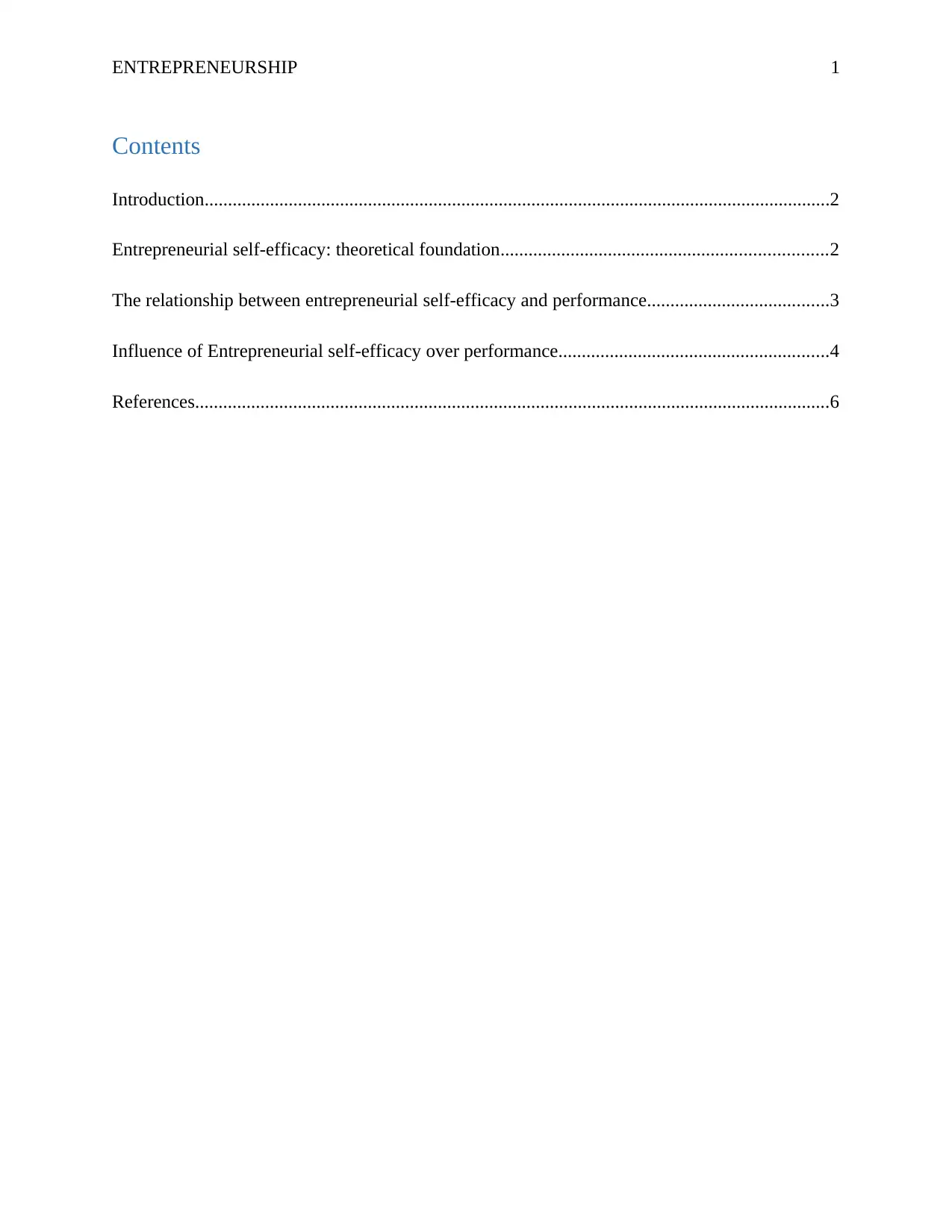
ENTREPRENEURSHIP 1
Contents
Introduction......................................................................................................................................2
Entrepreneurial self-efficacy: theoretical foundation......................................................................2
The relationship between entrepreneurial self-efficacy and performance.......................................3
Influence of Entrepreneurial self-efficacy over performance..........................................................4
References........................................................................................................................................6
Contents
Introduction......................................................................................................................................2
Entrepreneurial self-efficacy: theoretical foundation......................................................................2
The relationship between entrepreneurial self-efficacy and performance.......................................3
Influence of Entrepreneurial self-efficacy over performance..........................................................4
References........................................................................................................................................6
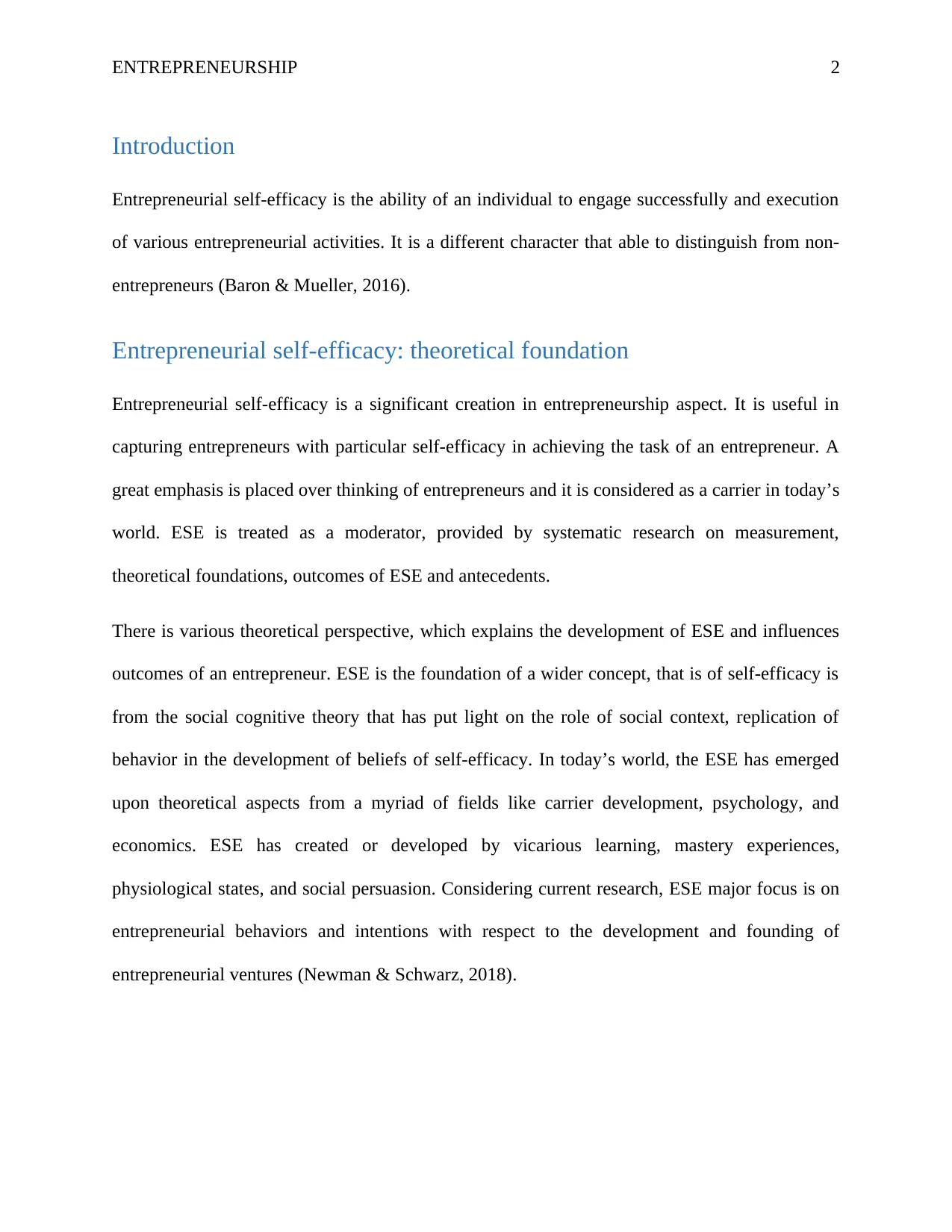
ENTREPRENEURSHIP 2
Introduction
Entrepreneurial self-efficacy is the ability of an individual to engage successfully and execution
of various entrepreneurial activities. It is a different character that able to distinguish from non-
entrepreneurs (Baron & Mueller, 2016).
Entrepreneurial self-efficacy: theoretical foundation
Entrepreneurial self-efficacy is a significant creation in entrepreneurship aspect. It is useful in
capturing entrepreneurs with particular self-efficacy in achieving the task of an entrepreneur. A
great emphasis is placed over thinking of entrepreneurs and it is considered as a carrier in today’s
world. ESE is treated as a moderator, provided by systematic research on measurement,
theoretical foundations, outcomes of ESE and antecedents.
There is various theoretical perspective, which explains the development of ESE and influences
outcomes of an entrepreneur. ESE is the foundation of a wider concept, that is of self-efficacy is
from the social cognitive theory that has put light on the role of social context, replication of
behavior in the development of beliefs of self-efficacy. In today’s world, the ESE has emerged
upon theoretical aspects from a myriad of fields like carrier development, psychology, and
economics. ESE has created or developed by vicarious learning, mastery experiences,
physiological states, and social persuasion. Considering current research, ESE major focus is on
entrepreneurial behaviors and intentions with respect to the development and founding of
entrepreneurial ventures (Newman & Schwarz, 2018).
Introduction
Entrepreneurial self-efficacy is the ability of an individual to engage successfully and execution
of various entrepreneurial activities. It is a different character that able to distinguish from non-
entrepreneurs (Baron & Mueller, 2016).
Entrepreneurial self-efficacy: theoretical foundation
Entrepreneurial self-efficacy is a significant creation in entrepreneurship aspect. It is useful in
capturing entrepreneurs with particular self-efficacy in achieving the task of an entrepreneur. A
great emphasis is placed over thinking of entrepreneurs and it is considered as a carrier in today’s
world. ESE is treated as a moderator, provided by systematic research on measurement,
theoretical foundations, outcomes of ESE and antecedents.
There is various theoretical perspective, which explains the development of ESE and influences
outcomes of an entrepreneur. ESE is the foundation of a wider concept, that is of self-efficacy is
from the social cognitive theory that has put light on the role of social context, replication of
behavior in the development of beliefs of self-efficacy. In today’s world, the ESE has emerged
upon theoretical aspects from a myriad of fields like carrier development, psychology, and
economics. ESE has created or developed by vicarious learning, mastery experiences,
physiological states, and social persuasion. Considering current research, ESE major focus is on
entrepreneurial behaviors and intentions with respect to the development and founding of
entrepreneurial ventures (Newman & Schwarz, 2018).
⊘ This is a preview!⊘
Do you want full access?
Subscribe today to unlock all pages.

Trusted by 1+ million students worldwide
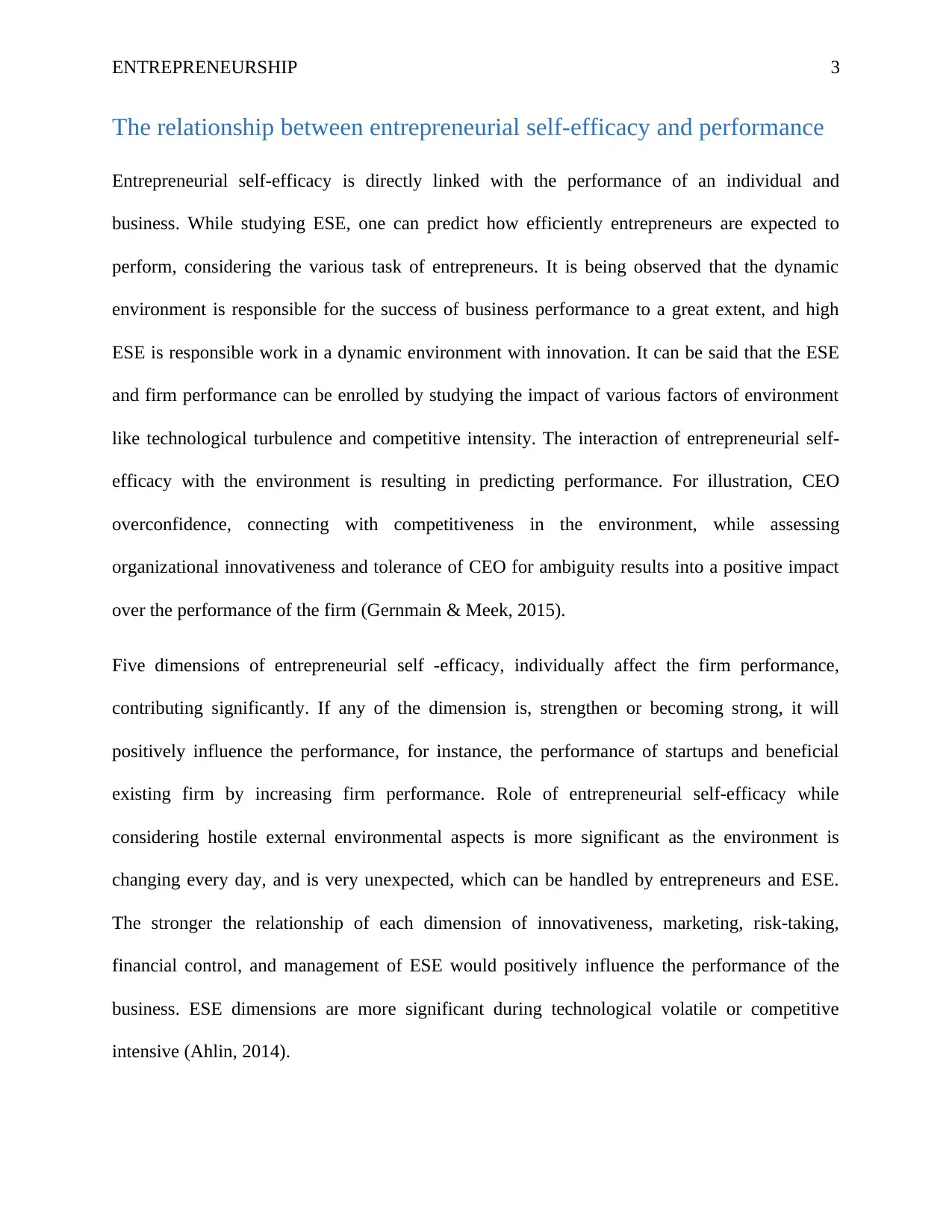
ENTREPRENEURSHIP 3
The relationship between entrepreneurial self-efficacy and performance
Entrepreneurial self-efficacy is directly linked with the performance of an individual and
business. While studying ESE, one can predict how efficiently entrepreneurs are expected to
perform, considering the various task of entrepreneurs. It is being observed that the dynamic
environment is responsible for the success of business performance to a great extent, and high
ESE is responsible work in a dynamic environment with innovation. It can be said that the ESE
and firm performance can be enrolled by studying the impact of various factors of environment
like technological turbulence and competitive intensity. The interaction of entrepreneurial self-
efficacy with the environment is resulting in predicting performance. For illustration, CEO
overconfidence, connecting with competitiveness in the environment, while assessing
organizational innovativeness and tolerance of CEO for ambiguity results into a positive impact
over the performance of the firm (Gernmain & Meek, 2015).
Five dimensions of entrepreneurial self -efficacy, individually affect the firm performance,
contributing significantly. If any of the dimension is, strengthen or becoming strong, it will
positively influence the performance, for instance, the performance of startups and beneficial
existing firm by increasing firm performance. Role of entrepreneurial self-efficacy while
considering hostile external environmental aspects is more significant as the environment is
changing every day, and is very unexpected, which can be handled by entrepreneurs and ESE.
The stronger the relationship of each dimension of innovativeness, marketing, risk-taking,
financial control, and management of ESE would positively influence the performance of the
business. ESE dimensions are more significant during technological volatile or competitive
intensive (Ahlin, 2014).
The relationship between entrepreneurial self-efficacy and performance
Entrepreneurial self-efficacy is directly linked with the performance of an individual and
business. While studying ESE, one can predict how efficiently entrepreneurs are expected to
perform, considering the various task of entrepreneurs. It is being observed that the dynamic
environment is responsible for the success of business performance to a great extent, and high
ESE is responsible work in a dynamic environment with innovation. It can be said that the ESE
and firm performance can be enrolled by studying the impact of various factors of environment
like technological turbulence and competitive intensity. The interaction of entrepreneurial self-
efficacy with the environment is resulting in predicting performance. For illustration, CEO
overconfidence, connecting with competitiveness in the environment, while assessing
organizational innovativeness and tolerance of CEO for ambiguity results into a positive impact
over the performance of the firm (Gernmain & Meek, 2015).
Five dimensions of entrepreneurial self -efficacy, individually affect the firm performance,
contributing significantly. If any of the dimension is, strengthen or becoming strong, it will
positively influence the performance, for instance, the performance of startups and beneficial
existing firm by increasing firm performance. Role of entrepreneurial self-efficacy while
considering hostile external environmental aspects is more significant as the environment is
changing every day, and is very unexpected, which can be handled by entrepreneurs and ESE.
The stronger the relationship of each dimension of innovativeness, marketing, risk-taking,
financial control, and management of ESE would positively influence the performance of the
business. ESE dimensions are more significant during technological volatile or competitive
intensive (Ahlin, 2014).
Paraphrase This Document
Need a fresh take? Get an instant paraphrase of this document with our AI Paraphraser
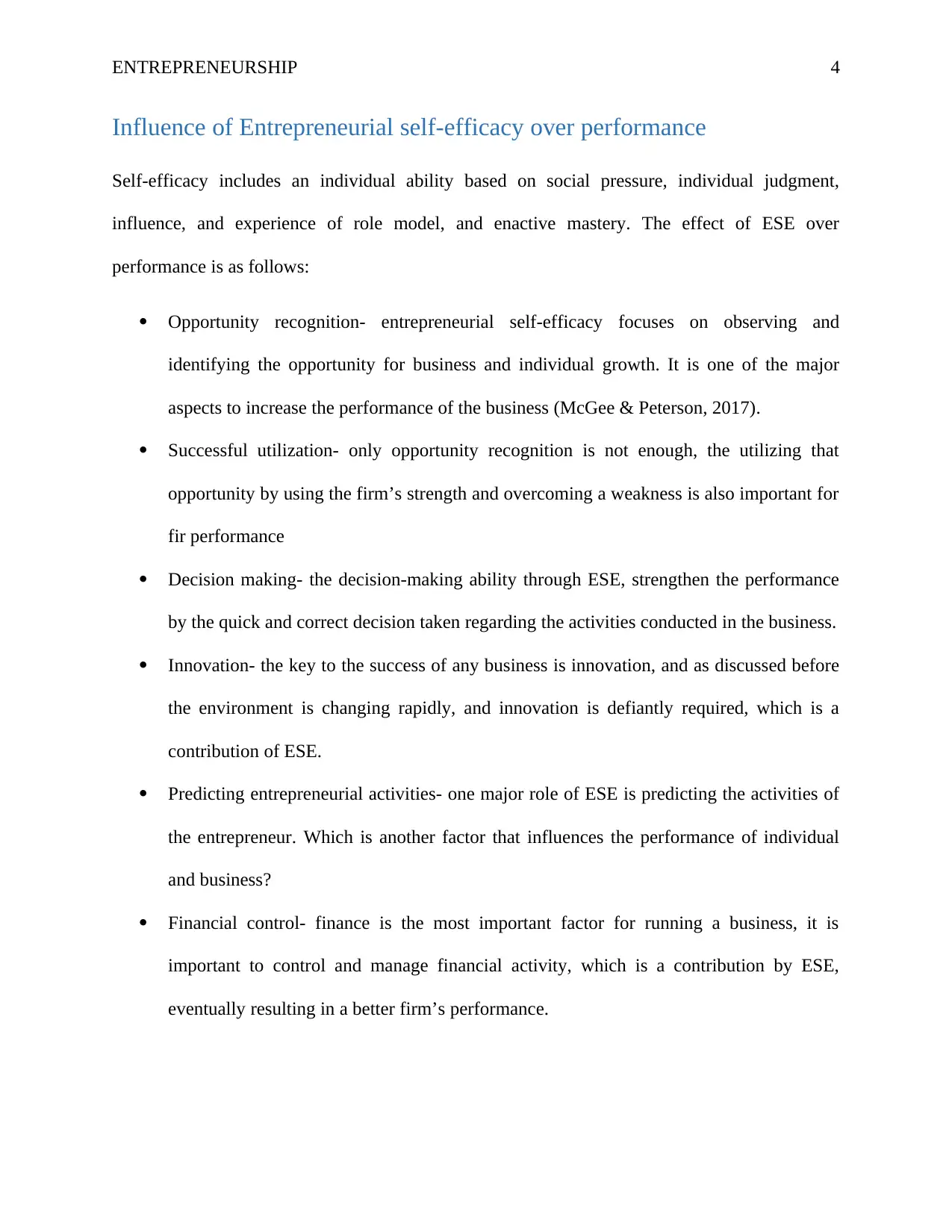
ENTREPRENEURSHIP 4
Influence of Entrepreneurial self-efficacy over performance
Self-efficacy includes an individual ability based on social pressure, individual judgment,
influence, and experience of role model, and enactive mastery. The effect of ESE over
performance is as follows:
Opportunity recognition- entrepreneurial self-efficacy focuses on observing and
identifying the opportunity for business and individual growth. It is one of the major
aspects to increase the performance of the business (McGee & Peterson, 2017).
Successful utilization- only opportunity recognition is not enough, the utilizing that
opportunity by using the firm’s strength and overcoming a weakness is also important for
fir performance
Decision making- the decision-making ability through ESE, strengthen the performance
by the quick and correct decision taken regarding the activities conducted in the business.
Innovation- the key to the success of any business is innovation, and as discussed before
the environment is changing rapidly, and innovation is defiantly required, which is a
contribution of ESE.
Predicting entrepreneurial activities- one major role of ESE is predicting the activities of
the entrepreneur. Which is another factor that influences the performance of individual
and business?
Financial control- finance is the most important factor for running a business, it is
important to control and manage financial activity, which is a contribution by ESE,
eventually resulting in a better firm’s performance.
Influence of Entrepreneurial self-efficacy over performance
Self-efficacy includes an individual ability based on social pressure, individual judgment,
influence, and experience of role model, and enactive mastery. The effect of ESE over
performance is as follows:
Opportunity recognition- entrepreneurial self-efficacy focuses on observing and
identifying the opportunity for business and individual growth. It is one of the major
aspects to increase the performance of the business (McGee & Peterson, 2017).
Successful utilization- only opportunity recognition is not enough, the utilizing that
opportunity by using the firm’s strength and overcoming a weakness is also important for
fir performance
Decision making- the decision-making ability through ESE, strengthen the performance
by the quick and correct decision taken regarding the activities conducted in the business.
Innovation- the key to the success of any business is innovation, and as discussed before
the environment is changing rapidly, and innovation is defiantly required, which is a
contribution of ESE.
Predicting entrepreneurial activities- one major role of ESE is predicting the activities of
the entrepreneur. Which is another factor that influences the performance of individual
and business?
Financial control- finance is the most important factor for running a business, it is
important to control and manage financial activity, which is a contribution by ESE,
eventually resulting in a better firm’s performance.
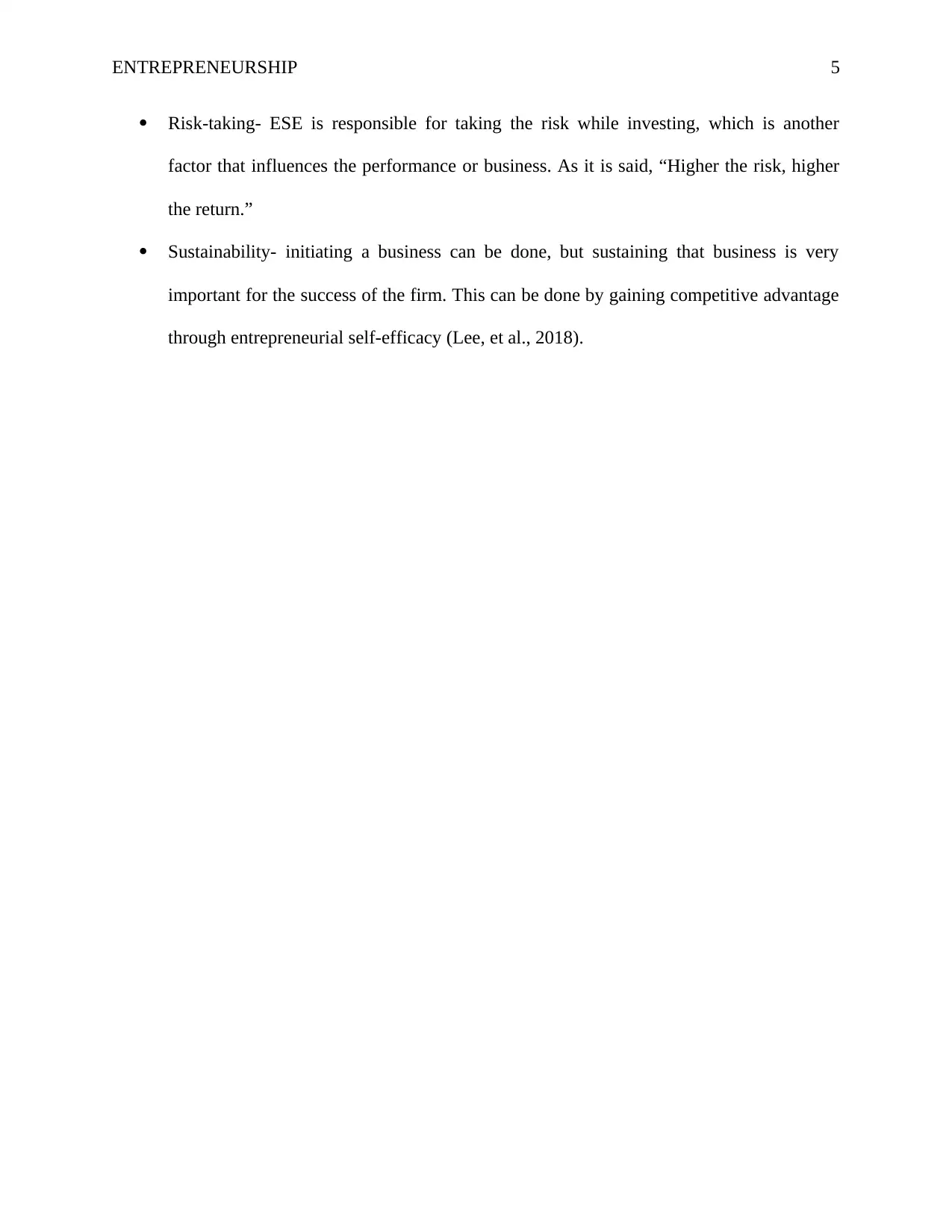
ENTREPRENEURSHIP 5
Risk-taking- ESE is responsible for taking the risk while investing, which is another
factor that influences the performance or business. As it is said, “Higher the risk, higher
the return.”
Sustainability- initiating a business can be done, but sustaining that business is very
important for the success of the firm. This can be done by gaining competitive advantage
through entrepreneurial self-efficacy (Lee, et al., 2018).
Risk-taking- ESE is responsible for taking the risk while investing, which is another
factor that influences the performance or business. As it is said, “Higher the risk, higher
the return.”
Sustainability- initiating a business can be done, but sustaining that business is very
important for the success of the firm. This can be done by gaining competitive advantage
through entrepreneurial self-efficacy (Lee, et al., 2018).
⊘ This is a preview!⊘
Do you want full access?
Subscribe today to unlock all pages.

Trusted by 1+ million students worldwide
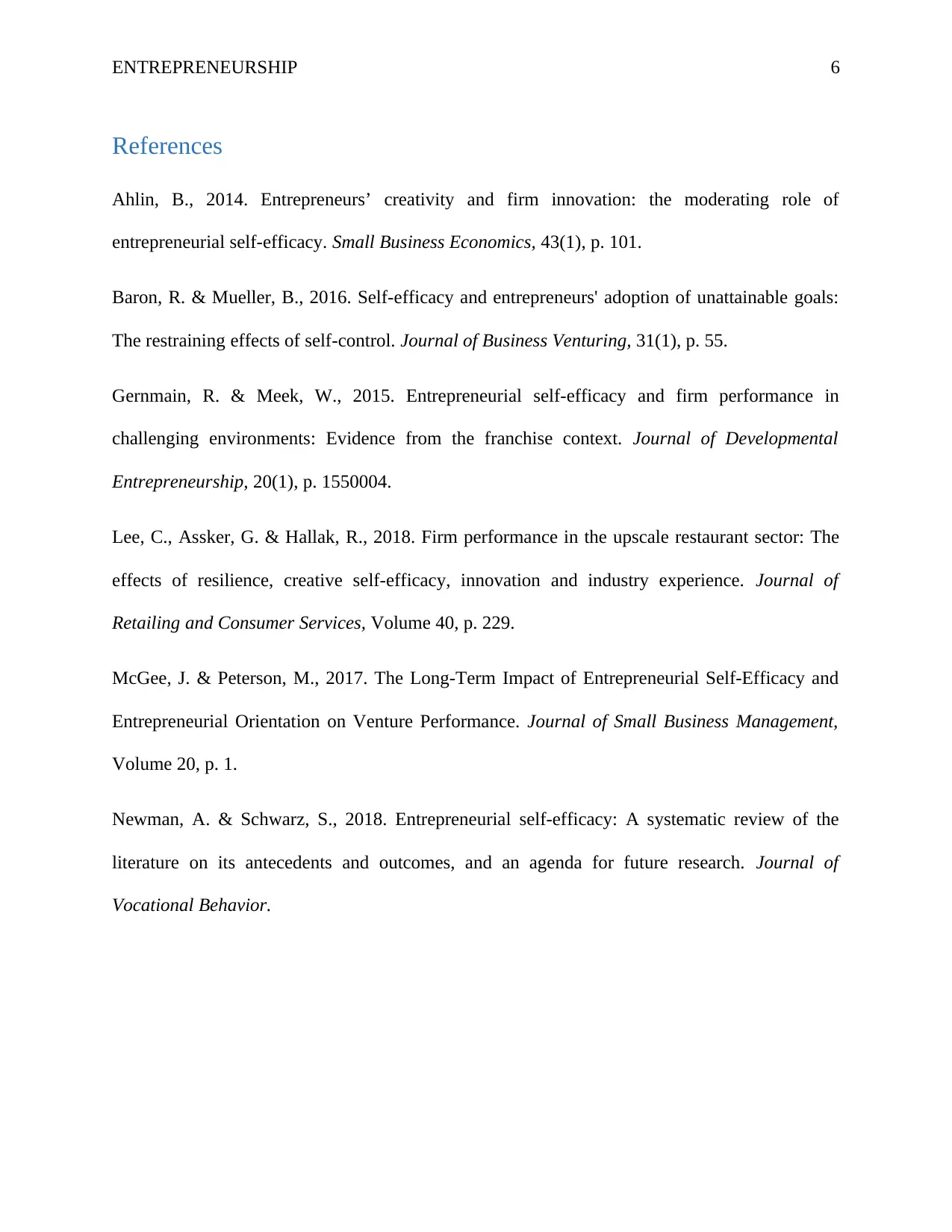
ENTREPRENEURSHIP 6
References
Ahlin, B., 2014. Entrepreneurs’ creativity and firm innovation: the moderating role of
entrepreneurial self-efficacy. Small Business Economics, 43(1), p. 101.
Baron, R. & Mueller, B., 2016. Self-efficacy and entrepreneurs' adoption of unattainable goals:
The restraining effects of self-control. Journal of Business Venturing, 31(1), p. 55.
Gernmain, R. & Meek, W., 2015. Entrepreneurial self-efficacy and firm performance in
challenging environments: Evidence from the franchise context. Journal of Developmental
Entrepreneurship, 20(1), p. 1550004.
Lee, C., Assker, G. & Hallak, R., 2018. Firm performance in the upscale restaurant sector: The
effects of resilience, creative self-efficacy, innovation and industry experience. Journal of
Retailing and Consumer Services, Volume 40, p. 229.
McGee, J. & Peterson, M., 2017. The Long‐Term Impact of Entrepreneurial Self‐Efficacy and
Entrepreneurial Orientation on Venture Performance. Journal of Small Business Management,
Volume 20, p. 1.
Newman, A. & Schwarz, S., 2018. Entrepreneurial self-efficacy: A systematic review of the
literature on its antecedents and outcomes, and an agenda for future research. Journal of
Vocational Behavior.
References
Ahlin, B., 2014. Entrepreneurs’ creativity and firm innovation: the moderating role of
entrepreneurial self-efficacy. Small Business Economics, 43(1), p. 101.
Baron, R. & Mueller, B., 2016. Self-efficacy and entrepreneurs' adoption of unattainable goals:
The restraining effects of self-control. Journal of Business Venturing, 31(1), p. 55.
Gernmain, R. & Meek, W., 2015. Entrepreneurial self-efficacy and firm performance in
challenging environments: Evidence from the franchise context. Journal of Developmental
Entrepreneurship, 20(1), p. 1550004.
Lee, C., Assker, G. & Hallak, R., 2018. Firm performance in the upscale restaurant sector: The
effects of resilience, creative self-efficacy, innovation and industry experience. Journal of
Retailing and Consumer Services, Volume 40, p. 229.
McGee, J. & Peterson, M., 2017. The Long‐Term Impact of Entrepreneurial Self‐Efficacy and
Entrepreneurial Orientation on Venture Performance. Journal of Small Business Management,
Volume 20, p. 1.
Newman, A. & Schwarz, S., 2018. Entrepreneurial self-efficacy: A systematic review of the
literature on its antecedents and outcomes, and an agenda for future research. Journal of
Vocational Behavior.
1 out of 7
Related Documents
Your All-in-One AI-Powered Toolkit for Academic Success.
+13062052269
info@desklib.com
Available 24*7 on WhatsApp / Email
![[object Object]](/_next/static/media/star-bottom.7253800d.svg)
Unlock your academic potential
Copyright © 2020–2026 A2Z Services. All Rights Reserved. Developed and managed by ZUCOL.



